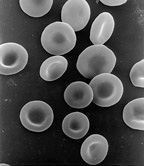Human cells grow blood vessels in mice
Sunday, July 20, 2008
Researchers in the United States reported Saturday that cells from human bone marrow, blood and umbilical cords successfully grew into blood vessels after being placed in mice. The group at Harvard Medical School and Children's Hospital Boston stated that the human cells, referred to as "progenitor cells", connected to the circulatory system of the mice. The team, lead by Harvard associate professor of medicine Joyce Bischoff, reported their findings in the journal Circulation Research, published by the American Heart Association.

Image: Drs. Noguchi, Rodgers, and Schechter of NIDDK (National Institutes of Health).
Juan M. Melero-Martin, a co-author of the paper in Circulation Research, said that one of the project's goals is to be able to replace some types of heart surgery with an injection of cells grown in a lab that could develop into functioning blood vessels.
"For clinical use, the way we envision it, if a patient has need to vascularize ischemic tissue, we can get cells from the patient ahead of time, grow them and inject them back into the patient," said Melero-Martin.
Ischemic tissue refers to tissue that has been damaged due to a lack of blood flow from blocked arteries or other causes. Researchers hope to be able to speed up the process of repairing damaged tissue and vessels in the heart to a period of one or two days. The procedure could potentially be used to treat organs damaged by heart attacks, or other ailments which impede circulation.
Due to their controversial nature the research team did not use stem cells in their study, but rather relied on progenitor cells taken from bone marrow or blood. "Our next goal down the line is to use them in humans. We need to do a lot more animal studies to test how these cells behave in different tissues," said Joyce Bischoff.
Dr. Nick Rhodes of the UK Centre for Tissue Engineering at the University of Liverpool described the results of the study as "interesting and promising", and commented: "Although this approach is not yet suitable for clinical use, it is interesting that they have demonstrated you have all the elements you need to create a functional network of capillaries from a small amount of blood."
Sources
- Maggie Fox. "Cells from humans grow blood vessels in mice: study" — Reuters, July 19, 2008
- Ed Edelson. "Heart Blood Vessels Grown in the Lab" — The Washington Post, July 18, 2008
- "Human blood vessels grown in mice" — BBC News, July 18, 2008
- Rob Waters. "Blood Vessels Made From Human Adult Stem Cells Grown in Mice" — Bloomberg.com, July 18, 2008
- Nidi Sharma. "Researchers Achieve Breakthrough In Growing Human Blood Vessels In Mice" — All Headline News, July 18, 2008
